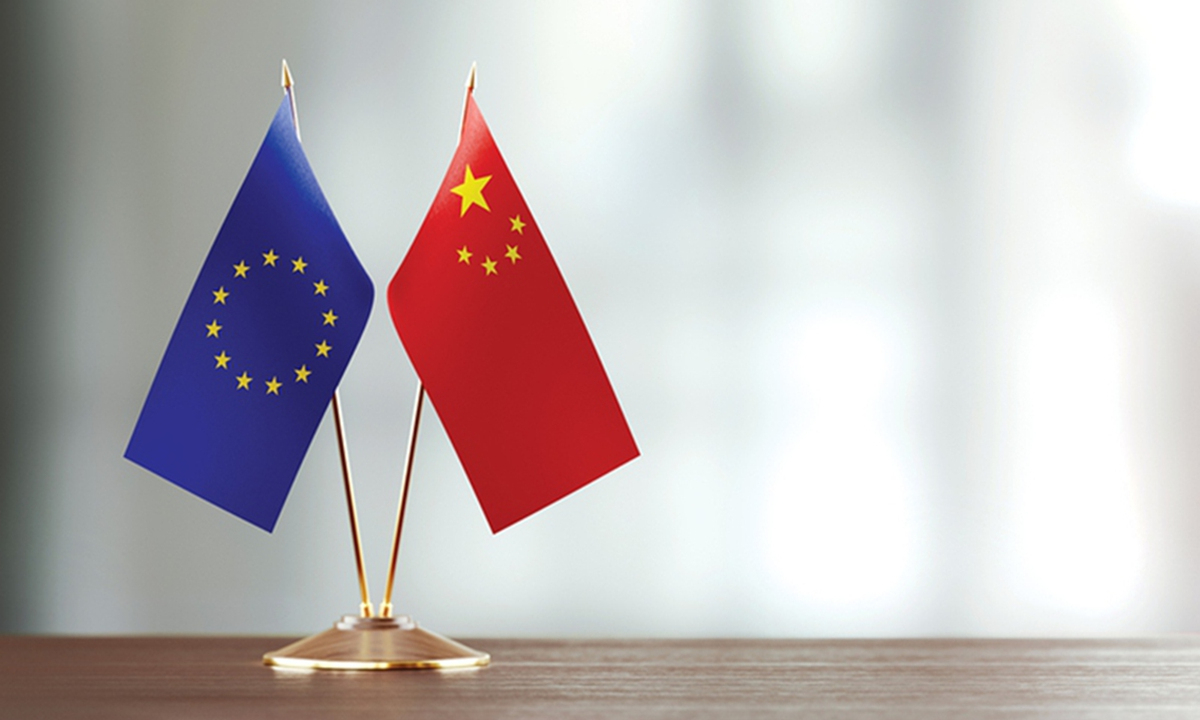
China EU Photo: VCG
China will hold the 10th High-level Economic and Trade Dialogue with the EU on Monday in Beijing. The dialogue, the first in-person meeting post-pandemic, has drawn growing attention and is expected to strengthen economic ties between the two parties.
Despite some disagreements being hyped by some EU politicians, the dialogue will serve as a good opportunity for China and the EU to enhance communication and understanding, Chinese observers said.
Candid and constructive talks are expected to be held during the talks, helping the EU to regain a sober mind on its policies toward Chinese firms and supply chains, instead of treating the latter as "a risk", paving the way for discussions on Europe's economic security during a meeting of European leaders in Spain on October 5, they noted.
The dialogue will be co-chaired by Chinese Vice Premier He Lifeng and Executive Vice President of the European Commission Valdis Dombrovskis.
In a speech delivered by Dombrovskis at the Bund Summit in Shanghai on Saturday, he said that "de-risking is not decoupling. And the EU has no intention of decoupling from China." He vowed to ramp up ties with China to manage trade issues and address global crises such as climate change.
Dombrovskis announced trade figures that showed that the EU had a deficit of almost €400 billion ($426 billion) out of a total trade of record-breaking €865 billion last year.
The EU has complained about the trade deficit. Brussels is expected to persuade China to export more European products during the high-level dialogue.
China has previously responded to the "unbalanced" trade issue, saying "China has never deliberately sought a trade surplus." China's trade surplus with the EU is a natural result of the combined influence of different industrial structures, industrial specialization, ways of trade and external factors.
"If the EU truly wants to address the issue, it needs to lift export controls against China, rather than putting the blame on China," a spokesperson for China's Foreign Ministry said in August.
The fact that the two economic powers could sit down face-to-face and talk about issues concerning economic policy, investment and supply chain proves the two sides aspire to strengthen economic cooperation -- the ballast and stabilizer in maintaining their bilateral ties, Cui Hongjian, director of the Department of European Studies at the China Institute of International Studies, told the Global Times.
The dialogue is expected to span green transformation, digitalization and global governance, Feng Zhongping, director of the Institute of European Studies at the Chinese Academy of Social Sciences, told the Global Times on Sunday.
Notably, China could raise concerns on the EU's anti-subsidy investigation of Chinese electric vehicles, according to Feng.
China's Ministry of Commerce on September 14 expressed serious concerns and strong opposition to the EU's investigation, calling the EU move "blatant protectionism" that will seriously disrupt and distort the global automotive supply chain, and have a negative impact on China-EU economic ties.
"Whether it is the transformation of green economy or digitalization, they have become the common direction for industrial upgrading and transformation in China and Europe. There is broad cooperation space in those areas," Feng said.
Regarding the EV sector, if the EU chooses to turn its back on China's supply chain in power battery and EV manufacturing, it could put the bloc's own EV sector at a disadvantage, Yu Qingjiao, secretary general of the Zhongguancun New Battery Technology Innovation Alliance, told the Global Times.
Faced with challenges posed by rising US protectionism that is weighing on the world's economic recovery, China and the EU should forge stronger ties and deepen cooperation on the basis of win-win instead of setting up hurdles against each other, Feng noted.
As long as both sides adhere to the concept of win-win cooperation and continue to communicate through effective channels such as the high-level dialogue, they will be able to better understand each other's genuine policy intentions, and make better plans for the future of China-EU economic and trade relations, according to Cui.




